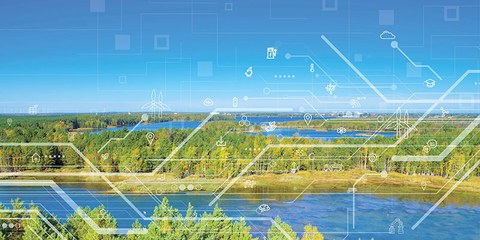Aug 11, 2025
Everyone has to play their part
Dagmar Möbius
Clara Hartung has been coordinating a visionary project for a year now. However, the TUD | Lusatia Campus is not exactly a single place you can visit. Rather, it is to be seen as an umbrella brand for structural change in Lusatia. A lot of coordination and communication is necessary to achieve this.
Just this regional development expert’s cup of tea. After completing her Bachelor's degree in Business Management, Clara Hartung moved to Upper Lusatia to study at the International Institute (IHI) Zittau and complete her Master in International Management. For the Berlin native, one of the 'exciting experiences you can have' there was living in a 19th-century Gründerzeit villa with 18 people. In her Master’s dissertation, she examined start-up behavior in rural areas. Even after that, she remained loyal to the region and worked for a development company in the Görlitz district for four years. When she read the job advertisement at TU Dresden for her current position, one thought immediately sprang to mind: 'This is a place where I can continue to shape things.'

TU Dresden is actively involved in Lusatia and is working on various projects to support structural change.
The challenges of structural change
The fact that coal is no longer being mined in Lusatia is not the only aspect of structural change. Demographic change, the climate crisis, scarce natural resources and the worsening shortage of skilled workers are just some of the other challenges. The TUD | Lusatia Campus seeks to address these problems. Research activities are being clustered in order to develop the region in collaboration with businesses, society and politics in a manner that is attractive, holistic and sustainable.
Five major themes, four locations
The broad spectrum currently covers five main topics:
- Digitalization
- Mobility
- Circular Economy
- Energy, and
- Societal change.
The TUD | Campus Lausitz will be represented at (at least) four locations in the future:
- in Zittau with the IHI and its five Master's degree programs
- in Görlitz with the German Center for Astrophysics (DZA) (please link to separate article) and the Construction Future Lab (CFLab)
- in Hoyerswerda with the Center for Green Circular Economy (CircEcon), the Smart Mobility Lab (SML) and the Reference Power Plant in Lusatia (RefLau), and
- in Bautzen (Living Art of Building), where the focus will be on sustainable building materials.
A constantly updated interactive map of the projects can be found here.
Working to build a multi-centric campus
The TUD | Campus Lausitz is a multi-centric campus and extends across the whole of Lusatia in Saxony. This allows us to tackle the challenges directly and develop the region holistically,' says Clara Hartung, who works in an office on the TUD campus in Dresden. She coordinates the numerous projects and liaises with the municipalities. 'Innovation and public services must go hand in hand. 'Only by developing both in tandem can we achieve successful regional development in Lusatia,' she explains. 'People don't just come for attractive jobs. Everyone is aware of that.' Hence: 'Everyone has to play their part.' Regional decision-makers are pleased to see progress being made and new prospects emerging. Moreover, it is equally important to avoid redundant structures.
Transformation knowledge conference in November 2025
What role has academia played as a stakeholder in the transformation processes of recent years and decades? Which fields and assumptions of utility structure the societal use of knowledge, and for what purposes is there societal demand – or not? What differentiations can be observed, for instance, between politics, planning, civil society, business, art, and science? How do the various forms of scientific knowledge enter society? What effect do they have there, and through which mechanisms?
These are just some of the many questions that will be addressed at a two-day conference in Zittau at the beginning of November 2025. The name of the event: 'Transformational Knowledge as a Problem Area of Social Change: Theory and Regional Application'. Clara Hartung co-organized the panel 'Lusatia as a science region: Science between regional development and international competition’. In addition to a keynote speech and other panels, the agenda includes excursions and intensive discussions.
Contact:
Clara Hartung
Coordinator, TUD | Lusatia Campus
Email:
